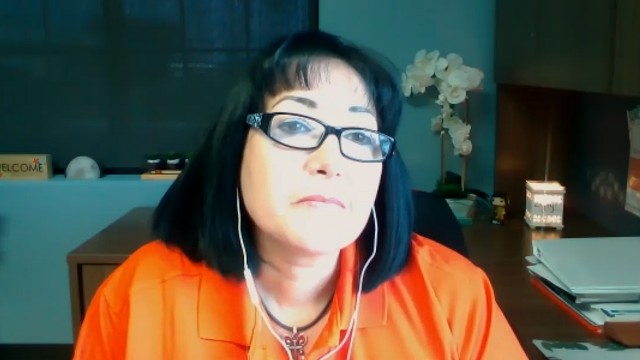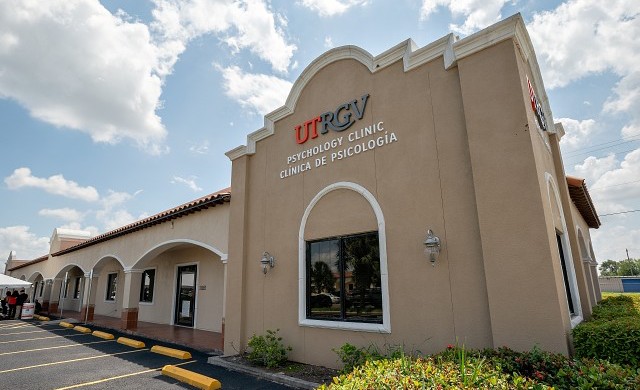UTRGV clinic director: Pandemic complicates mourning
UTRGV clinic director discusses grieving, consoling others from a distance
Friday, October 30, 2020
Community
By Maria Elena Hernandez
RIO GRANDE VALLEY, TEXAS – Día de los Muertos, like most events in 2020, will be a little different this year.
Traditional family gatherings to celebrate the lives of loved ones who have died is in stark contrast with the current state of mourners, who often are isolated due to COVID-19 and the precautions needed to stay safe and not spread the virus.
Dr. Cynthia Cavazos Gonzalez, director of the UTRGV Psychology Clinic, is herself one of the thousands of people in the Rio Grande Valley who wants to comfort family and friends after the death of a loved one.
She recently lost her brother to COVID-19.
And when a good friend's sister died, she could only reach out from a distance.
"I felt so helpless, so helpless," she said. "I was heartbroken and wanted to just, you know, go and see them and hug them and just be there.”
She said it's difficult to fight the urge to console someone grieving.
"It's a part of our human nature. And it is of benefit for our mental wellness," she said.
MULTIPLE PERSPECTIVES
When her brother died, members of her large family stopped by in their cars to show support, causing a mix of emotions.
"I remember just being fearful,” said Gonzalez, who has recovered from COVID-19 herself. “We said, 'You stay in your cars. You do not get off.' You know, because they're so vulnerable. And we want to protect them even more."
She said they wanted to touch her.
“And I wanted to touch them. And I said, 'You just look into my eyes and, you know, I love you for being here,’” she said.
Even as a psychologist whose role is to help her clients, Gonzalez was hesitant to talk about mourning her brother.
"But then I thought to myself, this is what it's about. It's a hard topic to discuss for anyone. It's complicated," she said.
PROLONGED GRIEF
For many during the COVID-19 pandemic, the natural grieving process has become a prolonged process. Not only are people not able to see the loved one when they were sick, but there also have been delays in funeral services and burials.
“That creates a very, very deep and profound sadness," Gonzalez said.
She recommends holding some type of event or doing some action to honor a relative or friend who has died.
"Because if you prolong it to two months from now, it's going to be very difficult for the grieving individuals," she said.

A PHYSICAL TOLL
Dealing with grief isn't just important for your mental well-being.
"It has an impact on your physical wellness," Gonzalez said. "When we have these fearful thoughts, or we're thinking quite a bit about something whether it's in a negative way or a sad way, that in turn manifests physically. Our body responds to it."
Gonzalez said clients have reported problems sleeping well, digestive issues and heart palpitations.
"I've had some individuals that have physical rashes, so the mind again controls the body. And when the mind is not mentally well, it's going to manifest in a physical way," she said.
IMPORTANT CONNECTIONS
The clinic director’s main recommendation for people mourning and those wanting to comfort them is to keep in touch with each other.
When her close friend was grieving, Gonzalez reached out with phone calls, texts and even snail mail.
"I could give her that kind of support, even though it was limited. And I still text her and share my low days, and she shares hers, too," she said. "We're living in a situation of uncertainty, so adapting to doing things and having connections with families are really important."
EYES FORWARD
As people deal with grief away from their usual support systems, Gonzalez said, mindset is important.
"Know that this is a challenge that's temporary. This lockdown, this inability to see one another, the social distancing – this is not going to last forever,” she said. “That's a very important kind of mindset to have."
And while people grieve, she said, they should focus on moving forward – one day at a time.
NEW APPROACHES
Family and friends have used technology to connect while mourning. Some of her older relatives even asked for her brother's funeral to be streamed, she said.
"Who would've thought, you know? Several years ago, we never would thought that anybody would be streaming funerals," she said.
A rosary over the phone was originally planned.
"But our kids said, 'No. You guys are going to do this virtually. And we'll set it up over here. And so-and-so can be over here. And we'll have the altar over here,’” Gonzalez said.
It was very different from their traditional rosary, she said, but it was a great experience to connect with others and included people who normally wouldn't have attended.
"We've got to think differently, you know, and those are some examples," she said.

COMMUNITY MOURNING
According to the Texas Department of State Health Services, more than 2,800 people in the Rio Grande Valley who have had COVID-19 have died, and Gonzalez said even people who don't directly know someone who has died could be experiencing grief.
"I do think that that's important to know. There is some sadness going on just in general," she said.
Earlier this year, the UTRGV Psychology Clinic launched a "warmline," a free counseling telephone service for people experiencing emotional and mental distress related to the pandemic. The phone number is (956) 665-8800.
You can learn more about services the clinic provides by visiting utrgv.edu/psychology-clinic.
ABOUT UTRGV
The University of Texas Rio Grande Valley (UTRGV) was created by the Texas Legislature in 2013 as the first major public university of the 21st century in Texas. This transformative initiative provided the opportunity to expand educational opportunities in the Rio Grande Valley, including a new School of Medicine and a School of Podiatry, and made it possible for residents of the region to benefit from the Permanent University Fund – a public endowment contributing support to the University of Texas System and other institutions.
UTRGV has campuses and off-campus research and teaching sites throughout the Rio Grande Valley including Brownsville (formerly The University of Texas at Brownsville campus), Edinburg (formerly The University of Texas-Pan American campus), Harlingen, Weslaco, McAllen, Port Isabel, Rio Grande City and South Padre Island. UTRGV, a comprehensive academic institution, enrolled its first class in the fall of 2015; the School of Medicine welcomed its first class in the summer of 2016, and the School of Podiatric Medicine in the fall of 2022.
